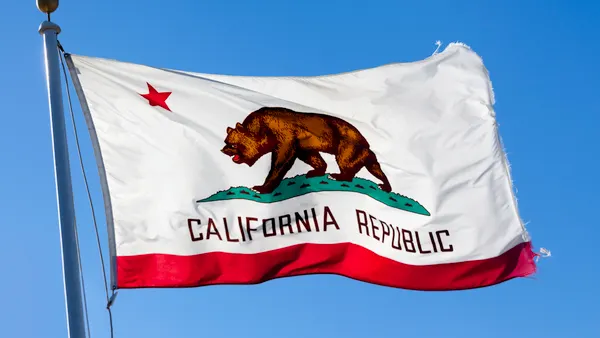Dive Brief:
- The leaders of 13 Fortune 500 companies have launched a new initiative calling for action on climate change, including lobbying lawmakers to develop an economy-wide price on carbon.
- The CEO Climate Dialogue says it aims to build bipartisan support for climate policies that address climate risk, increase regulatory and business certainty and spur investment "to meet science-based emissions reduction targets."
- The coalition includes major oil companies like Shell and BP, big utilities, including Pacific Gas & Electric (PG&E) and Dominion Energy, and environmental groups like the Environmental Defense Fund.
Dive Insight:
Some of the companies lobbying for a price on carbon are not those you would typically expect, laying out new avenues for debate. Whether or not they can be successful is another question.
"The most underused tool for fighting climate change is corporate advocacy," EDF President Fred Krupp said in a statement. "Business voices matter to Congress, but the vast majority of companies have been missing from the climate policy debate."
That appears to be changing. Other companies involved in the CEO Dialogue project include: Exelon, DTE Energy, Unilever, BASF, DuPont, Dow, Ford, Citi and LafargeHolcim. Advocacy groups include the Center for Climate and Energy Solutions, the Nature Conservancy and the World Resources Institute.
PG&E told Utility Dive the risks associated with a changing climate "are bigger than any one entity and will require comprehensive and holistic action."
"Policy frameworks that directly price carbon emissions can be an effective tool in driving investment in clean-energy technologies and critical reductions in greenhouse gas emissions," the utility said, adding that it "has long supported economy-wide solutions to address climate risk, including a price on carbon."
PG&E advocated for the passage of California Assembly Bills 32 and 398, which led to the state's carbon-pricing system.
"Our state is proof that, when crafted correctly, a market-based approach to valuing or pricing carbon can both strengthen our economy and reduce harmful greenhouse gas emissions," PG&E said.
Dominion echoed those comments as well, telling Utility Dive ut has been involved in various policy discussions about reducing greenhouse gas emissions for over a decade.
"We have supported an economy-wide, market based approach in the past, and this is a natural continuation of that conversation," the company said in a statement.
In a similar vein, BP America Chairman and President Susan Dio said the company supports the Paris Accord's climate goals and "has long advocated for a well-designed, economy-wide price on carbon to help deliver them."
But on the same day the CEO Dialogue announced its plans, comments at a House Ways and Means Committee hearing on climate change illustrated the challenges ahead for those advocating for a carbon price.
"We must instead incentivize affordable clean energy and make smart investments in cutting-edge technologies," said Texas Rep. Kevin Brady, the leading Republican on the committee. "But the way to do so is not through increased taxes and overly burdensome regulations."
"We believe a carbon tax is not the solution to address our environmental challenges," Brady said, adding that countries that have implemented a price on carbon made only a "negligible" impact on global emissions and "many have simply exported their pollution."
Nevertheless, companies are increasingly focused on reducing their carbon footprint, out of both a concern over climate change and pressure by activist investors, while keeping an eye on their bottom lines.
In 2018, corporations signed deals for 13.4 GW of clean energy globally — more than doubling 2017's record amount of 6.1 GW. And Moody's Investor Service is considering developing a carbon transition assessment for public, non-financial companies, in recognition of the "risks and opportunities" businesses may face as they look to access capital.
The CEO Dialogue outlined a half dozen principles it says will be necessary to "inform and accelerate federal climate legislation." Along with safeguarding against negative impacts and promoting equity, the group said the solution needs to be "market-based."
"An economy-wide price on carbon is the best way to use the power of the market to achieve carbon reduction goals in a simple, coherent and efficient manner," the group said. "We desire to do this at the least cost to the economy and households."
But the group also said policies to address climate change will not be free.
"Unabated climate change is a major threat to the U.S. economy," the group said. "Therefore, policies to address climate change, which may also entail some cost, must provide transparency and promote affordability while distributing costs and benefits in such a way that promotes equity. "














